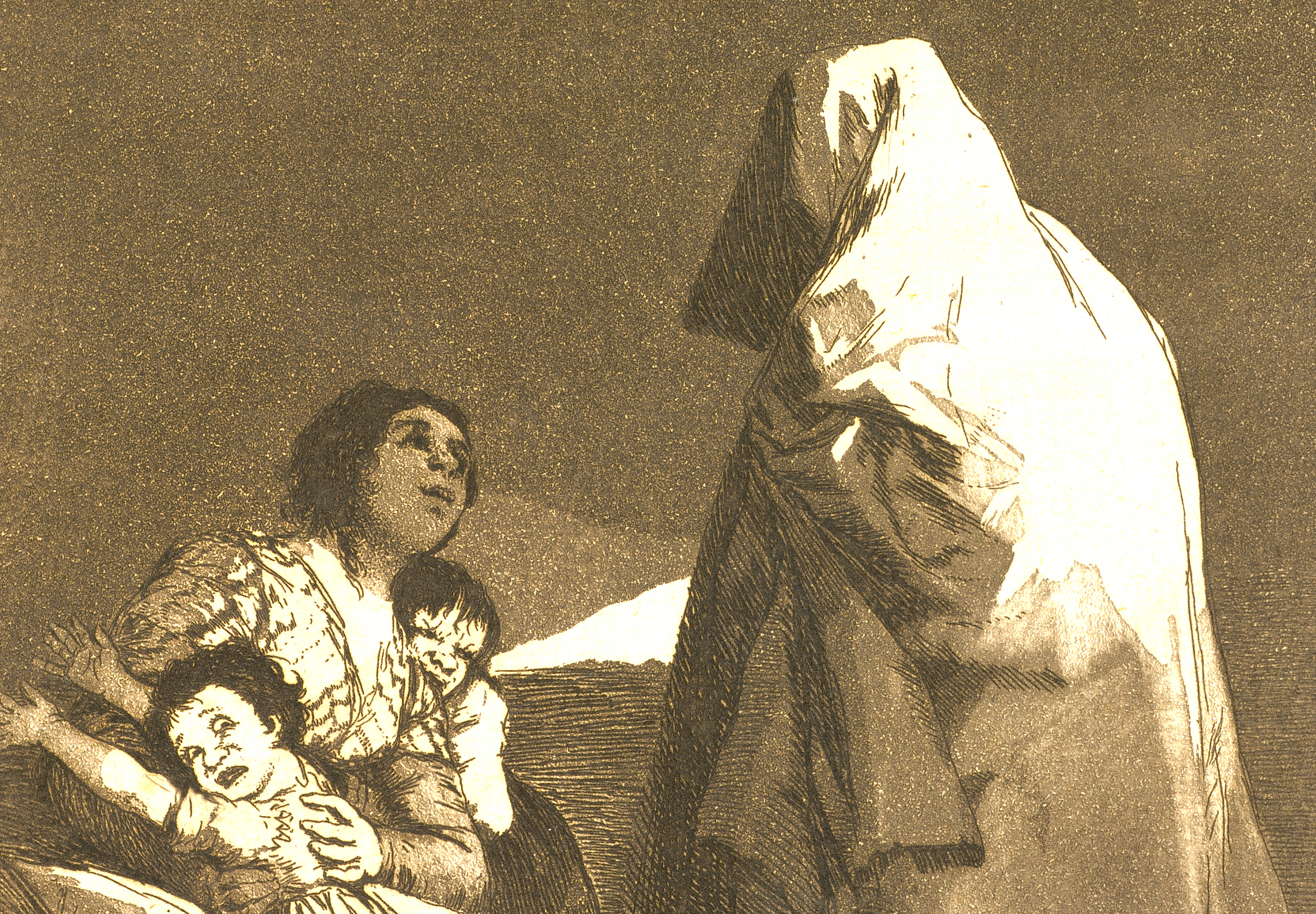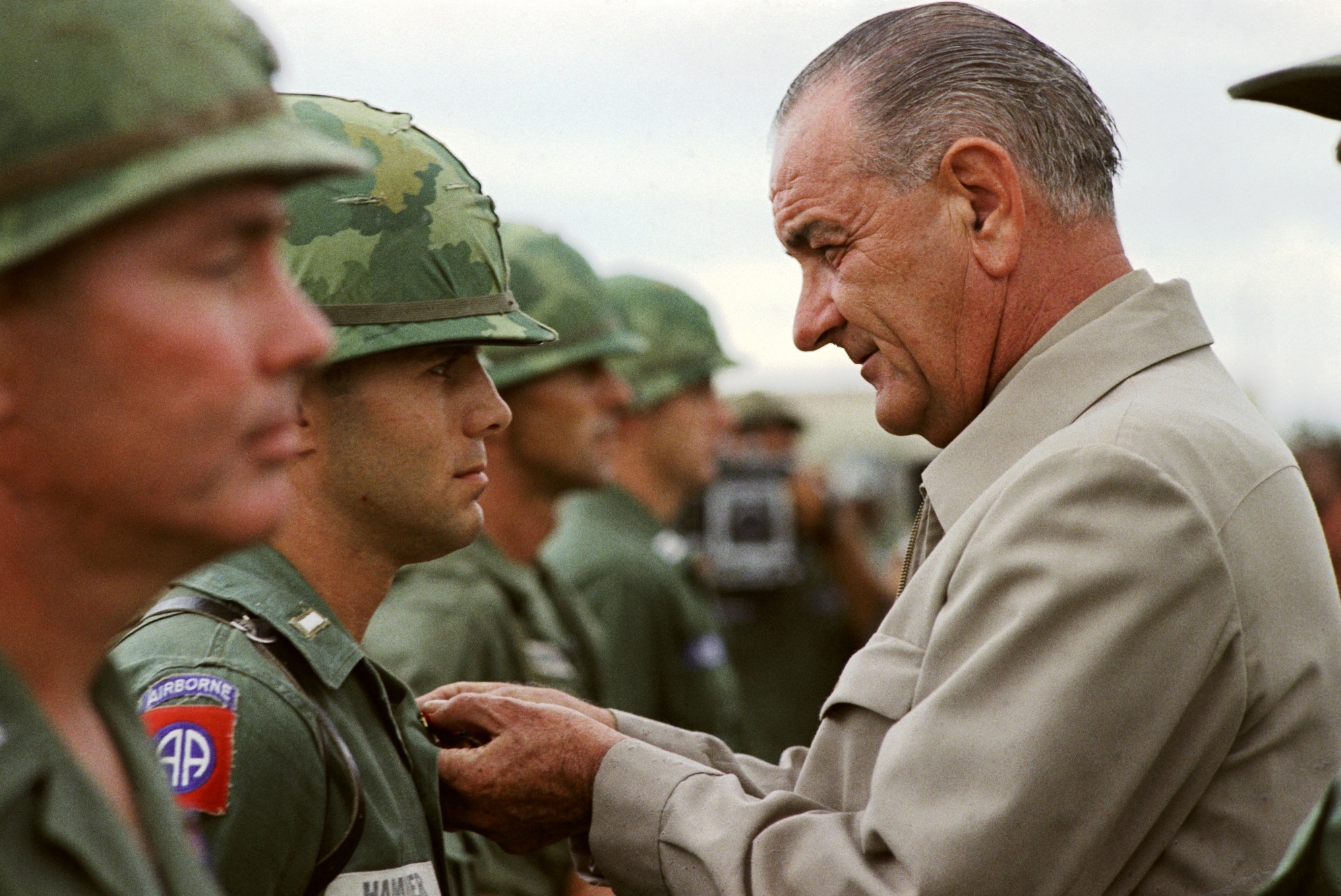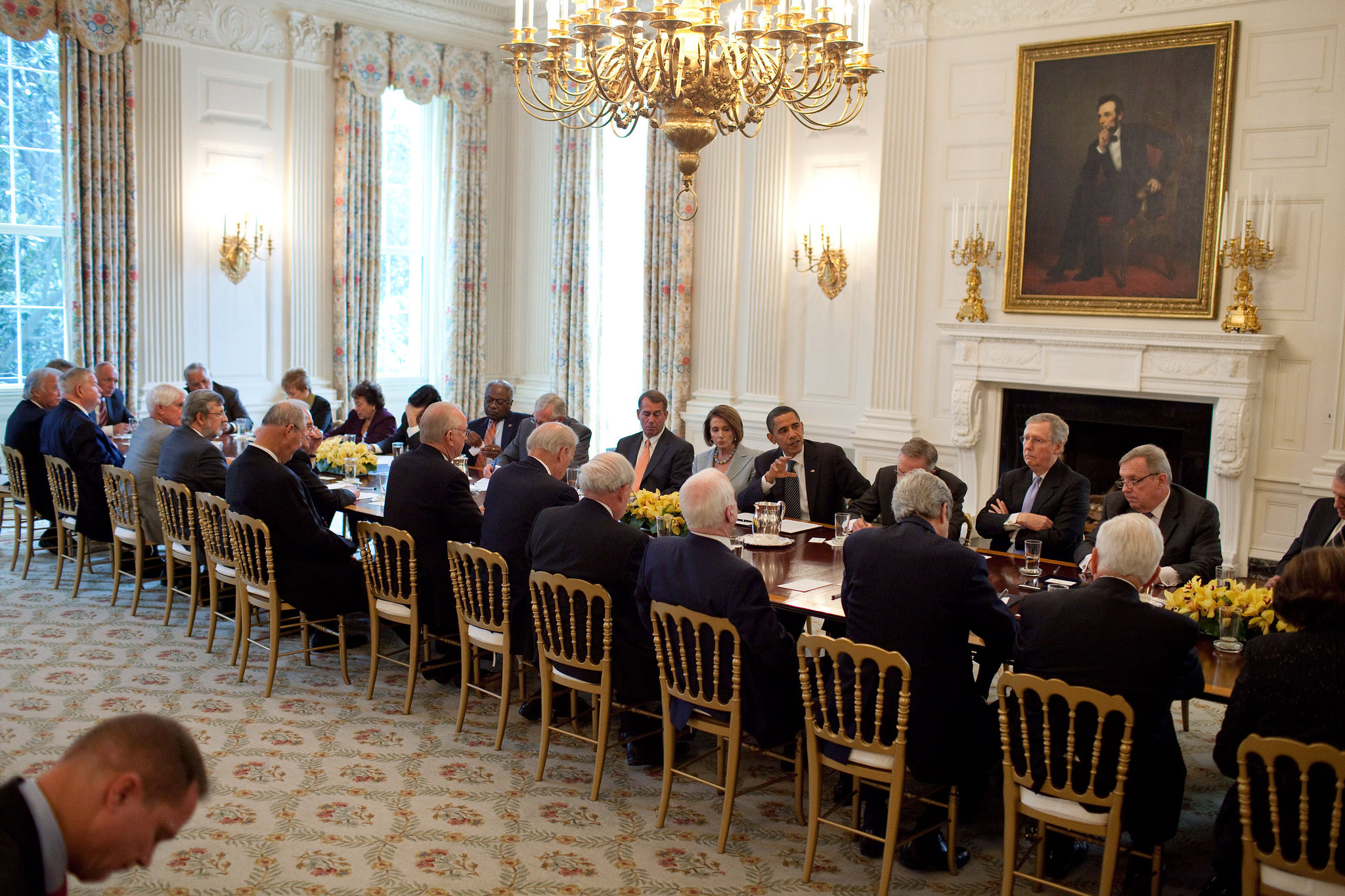The term has long been invoked by politicians to sanctify their own power, writes James Bovard.

Detail of Francisco de Goya’s “Que viene el coco,” or “Here Comes the Bogey-Man,” 1799. (National Gallery of Art. Wikimedia Commons)
By James Bovard
The Future of Freedom Foundation
 “Extremists” are one of the famous bogeymen that American politicians invoke to sanctify their own power. But the definition of “extremism” has forever been in flux. The only consistent element in definitions of extremism is that politicians always win.
“Extremists” are one of the famous bogeymen that American politicians invoke to sanctify their own power. But the definition of “extremism” has forever been in flux. The only consistent element in definitions of extremism is that politicians always win.
In the 1770s, people who suggested that the king of England had no right to rule America were considered extremists. Even a 2013 Pentagon instructional document declared that “the colonists who sought to free themselves from British rule” were an example of “extremist movements.”
In the 1850s, Southerners who suggested freeing the slaves were considered dangerous extremists who were often censored into silence. Northerners who suggested that the South needed to be militarily ravaged were considered extremists, at least until John Brown was awarded sainthood.
In the 1920s, people who suggested that the president should have the power to confiscate citizens’ gold were considered extremists — if not communists.
After 1934, people who denounced the federal confiscation of Americans’ gold were often considered extremists.
Please Contribute to Consortium News
During its 2020 Winter Fund Drive
In the post–World War Two era, presidents routinely invoked fighting “extremism” to sanctify their killings or smear their critics.
In 1952, when Republicans criticized the Korean War as useless, President Harry Truman condemned “reckless and irresponsible Republican extremists” and “the false version of history that has been copyrighted by the extremists in the Republican Party.” But the lies and atrocities that permeated the U.S. military campaign in Korea were sufficiently widely recognized to destroy Truman’s presidency.
In 1964, Lyndon Johnson declared, “Extremism in the pursuit of the Presidency is an unpardonable vice, and moderation in the affairs of the Nation is the highest virtue.” The media portrayed Johnson as a moderate choice even though he was heavily bombing North Vietnam and, despite his denials to voters, preparing a massive military escalation of the conflict.

President Lyndon B. Johnson in 1966 giving soldier an award while in Vietnam. (Yoichi Okamoto, LBJ Library, Wikimedia Commons)
In 1965, after Johnson sent U.S. Marines into the Dominican Republic to prop up a military junta that had just seized power, he announced that “the Dominican people … [do] not want government by extremists of either the left or right.” As long as he denounced extremists and recited bogus warnings of Communist takeovers, the thousands of Dominicans killed in the subsequent fighting became sacrifices on the altar of moderation.
In 1966, in a speech at the East-West Center in Honolulu, Johnson lamented, “There remain in Asia voices of extremism and apostles of militancy.” The prior year, his State Department had secretly endorsed a brutal crackdown by the Indonesian military on suspected communists (or people who lived in the vicinity of suspected communists). Half a million Indonesians were slaughtered with Johnson’s approval in carnage that the CIA labeled “one of the worst mass murders of the 20th century.”
Clinton & Bush
Bill Clinton routinely used extremism to tar political opposition. In 1999, he told the Democratic Leadership Council that “we are still confronting a level of extremism and partisanship [from Republicans] which is truly chilling for the long-term interests of America.” But it wasn’t the Republicans who had engaged in six years of non-stop lying to stretch and sanctify federal power. On the eve of the 2000 election, Clinton declared, “Someone needs to be doing what I’ve done for the last six years, which is to stop extremism in Washington, D.C., and you certainly only have one choice: Al Gore.” Gore lost, in part because many voters feared he would bring more extremism in Washington.
Prior to September 2001, anyone who suggested that the U.S. government lead a crusade to “rid the world of evil” would have been labeled both an extremist and a loon. But when George W. Bush promised exactly that three days after 9/11, the media cheered and his approval ratings soared.

Standing on top of a crumpled fire truck at Ground Zero with retired New York City firefighter Bob Beckwith, President George W. Bush gives an impromptu speech on Sept. 14, 2001. (Eric Draper, George W. Bush Presidential Library and Museum, U.S. National Archives)
In 2004, after the U.S.-controlled Afghan government held a fraud-ridden election in 2004, Bush proclaimed, “The success of Afghanistan’s election is a standing rebuke to cynicism and extremism and a testimony to the power of liberty and hope.” But Afghanistan soon plunged into a downward spiral, spurring even more U.S. government rigging of subsequent Afghan elections.
In 2004, Bush sanctified his war on terrorism: “This struggle between political extremism and civilized values is unfolding in many places.” And any methods the Bush administration used — including torture — were “civilized” by definition because the opponents were extremists.
Extremists were one of Bush’s favorite straw men. Bush told a group of journalists, “We actually misnamed the war on terror. It ought to be the struggle against ideological extremists who do not believe in free societies who happen to use terror as a weapon to try to shake the conscience of the free world.” Washington Post reporter Dana Milbank suggested an acronym for Bush’s new declaration of war: SAIEWDNBIFSWHTUTAAWTTTSTCOTFW.
In his 2005 State of the Union address to Congress, Bush boasted of the recent Iraqi elections, “The whole world now knows that a small group of extremists will not overturn the will of the Iraqi people.” Iraq’s 2005 election was more akin to a Soviet Bloc referendum than a New England town meeting. American troops traveled around broadcasting a get-out-and-vote message at the same time they raided people’s homes. After soldiers passed out thousands of sample ballots, the top UN election official condemned U.S. military interference.
Obama
In 2009, in his first speech to Congress, Barack Obama declared, “To overcome extremism, we must also be vigilant in upholding the values our troops defend — because there is no force in the world more powerful than the example of America.” Obama invoked extremism to justify any and every power grab he committed. As part of its war against violent extremism, the Obama administration claimed a right to kill Americans without a trial, without notice, and without any chance for targets to legally object.
In a December 2009 speech at West Point, Obama announced that he would send far more U.S. soldiers to Afghanistan as part of the “struggle against violent extremism” — which he said would be “an enduring test of our free society.” More than a thousand Americans subsequently were killed in Afghanistan in an escalation which did nothing more than prolong the war. The CIA had sought to warn Obama that his “surge” would be a failure, but a little crowding in Arlington Cemetery was a small price to pay for burnishing Obama’s tough-guy image.

President Barack Obama meets with congressional leaders and committee chairs to discuss Afghanistan and Pakistan, Oct. 6, 2009. (White House, Pete Souza)
In 2011, Obama justified bombing Libya so that that nation would not become “a new safe haven for extremists.” After the United States helped topple Libya’s dictator, extremists seized control of much of the nation and violence claimed thousands of victims (including four Americans killed in Benghazi in 2012). The slave markets that began openly operating in Libya after the U.S. bombing were not formally part of the president’s anti-extremism campaign.
In 2014, Obama justified U.S. military intervention Syria: “What we’re also fighting is an ideological strain of extremism that has taken root in too many parts of the region.” The Obama administration launched more than 5,000 airstrikes on Syrian targets but its pretensions of virtue were the only consistent aspect of its policies. The U.S. government provided arms and money to radical groups tied to al-Qaeda and other Muslim fanatics as part of the U.S. campaign to topple the Assad government. U.S. policy was so muddled that Pentagon-backed Syrian rebels openly battled CIA-backed Syrian rebels.
Trump
In May 2017, Donald Trump visited Saudi Arabia and proclaimed that the United States and the Saudis “seek to embark on new initiatives to counter violent extremist messaging, disrupt financing of terrorism, and advance defense cooperation.” The fact that Saudi government officials had provided financial aid to the 9/11 hijackers (15 of the 19 were Saudis) was not permitted to tarnish the photo opportunity.

President Donald Trump and First Lady Melania Trump join King Salman bin Abdulaziz Al Saud of Saudi Arabia, and Egyptian President Abdel Fattah Al Sisi, May 21, 2017, for the opening of the Global Center for Combating Extremist Ideology. (White House, Shealah Craighead)
Three months later, the White House issued a readout of Trump’s phone call with King Salman bin Abdulaziz al-Saud that stressed that the leaders “discussed the need to defeat terrorism, cut off terrorist funding, and combat extremist ideology.” The press release was not cluttered with the fact that the Saudis have perennially been among the world’s largest financiers of terrorism and radical Islamic movements.
In November 2017, after gunmen killed hundreds of people in a mosque in Egypt, Trump proclaimed, “The world cannot tolerate terrorism. We must defeat them militarily and discredit the extremist ideology that forms the basis of their existence!” Two years later, he astounded attendees at an international summit by hailing Egyptian ruler Abdel Fattah el-Sisi as “my favorite dictator.” Sisi is notorious for killing dissidents, mass arrests, and brutal detention of anyone who protests his abuses. But since Sisi usually followed orders from Washington, his designation as a moderate was irrevocable.
Flag of Convenience
The definition of “extremism” is often a flag of convenience for the Establishment. As a Pentagon training manual on the danger of hate groups noted, “All nations have an ideology, something in which they believe. When a political ideology falls outside the norms of a society, it is known as extremism.” In other words, beliefs that differ from prevailing or approved opinions are “extremist” by definition. And who gets to say what is acceptable to believe? The same politicians and government agencies whose power is buttressed by prevailing opinions.
“Extremism” is even more vaporous than “terrorism.” With terrorism, at least the malefactors are conniving to inflict violence. An extremist, on the other hand, is someone with a bad attitude who might do something unpleasant in the future. Crackdowns on supposed extremists can provide the perfect tool to demonize political opposition at home and abroad.
Politicians denounce extremism at the same time the establishment media blanches from publicizing government abuses. The greater the taint of being accused of extremist tendencies, the easier it becomes for government officials to cover up atrocities.
In early 2004, before Abu Ghraib photos leaked out, people who said the U.S. government was torturing detainees were considered extremists. A decade later, after a Senate report documented how the CIA had set up a worldwide torture regime, people who favored vigorously prosecuting CIA torturers were considered extremists. Similarly, people who claimed that the U.S. government was massively illegally violating Americans’ privacy after 9/11 were considered extremists. After Edward Snowden leaked documents in 2013 proving that the National Security Administration had illegally seized the emails of millions of Americans, only extremists favored prosecuting NSA chieftains who had lied to Congress and the American public about their illicit surveillance.
Americans have perennially acquiesced in the government’s seizing of almost unlimited power in the war against extremism. But to permit politicians to define extremism is to let them preemptively vilify their most dangerous critics. Luckily, it is not yet illegal to suggest that the government itself has become the greatest extremist of them all.
James Bovard is a policy adviser to The Future of Freedom Foundation. He is a USA Today columnist and has written for The New York Times, The Wall Street Journal, The Washington Post, New Republic, Reader’s Digest, Playboy, American Spectator, Investors Business Daily, and many other publications. He is the author of Freedom Frauds: Hard Lessons in American Liberty (2017, published by FFF); Public Policy Hooligan (2012); Attention Deficit Democracy (2006); The Bush Betrayal (2004); Terrorism and Tyranny (2003); Feeling Your Pain (2000); Freedom in Chains (1999); Shakedown (1995); Lost Rights (1994); The Fair Trade Fraud (1991); and The Farm Fiasco (1989). Read his blog. Send him email.
This article is from The Future of Freedom Foundation
The views expressed are solely those of the author and may or may not reflect those of Consortium News.
Please Contribute to Consortium News During its 2020 Winter Fund Drive
Donate securely with
Click on ‘Return to PayPal’ here.
Or securely by credit card or check by clicking the red button:



I can throw that “extremist”, “stereotype threat” around with the best of them and they don’t much like it let me assure you. I encourage everyone to wiki stereotype, SEE ESPECIALLY “EXPLICIT STEREOTYPE”
Mr. Bovards’s piece pretty much speaks for it’s self. Read it carefully. Maybe read it twice.
Our country’s military, intelligence community I.e. in short Ray McGovern’s MICIMATT rendered the Overton Window useless to the masses and unfortunately had done so long ago with propaganda. They started in earnest about the time Mr. Overton was born.
Joe P. Overton was a think tank guy, who at the ripe old age of 20 something came along during the Reagan years
when D.C. relished telling Americans what they should believe and why. A constant from the time of JFK deaths until this very second. The O window worked well for those who sought to use it for perverse means. NEOCONS
In his defense he had a brilliant grasp of a theory that would aid the masses if it were applicable but considering the lies emanating from D.C. since 1947 it was never really something that positively affected U.S. politics, unless that is it helped the ruling elite. The neocons.
PEG – So who is it that determines what those limits are on the Overton Window these days, the MSM? Nice concept maybe to aid the MSM in their half-assed attempt to inform the public but of very little use in ensuring information isn’t simply “ginned up” at the best and lied about at the worst.
Overton’s concept is valid, or could be but it is simply never accurately reflected electoral politics in the U.S.
That is left to the MSM and spoon fed to them by their corporate owners, The two party system in league with MSM has created their own window and the media outlets suck it up like the gravy sucking pigs they are.
One might be best served to go back and review the lies that passed for the truth during his life.
I mean seriously this country’s government flatly refuses to let the public roam it’s realm of secrets.
Ask any professional and they will tell you they tend to make decisions based on the best information they have available to them at the time in question. We who make up the masses receive only mushroom fertilizer. I can prove that trying to obtain factual info on this nations policies etc. is impossible without lots of work and help.
This two party system has become a total farce. Binden is about to prove just what I’m saying and I have to tell you I have a half dozen female grand children who assures I never was a proponent of the fake President Reject, King Virus Trump.
To be sure , we, my countrymen and myself, cannot afford another 4 or 8 or 12 years of gridlock and inept government leadership.
We don’t need war, any war or to be bull shitted any longer, we need to get together and fix this mess. This government is supposed to work for us not the other way around and time is running out.
PEG you are right and time is running out, that black man is seeing if he doesn’t stand up soon all will be lost. He sees the truth much more clearly that most whites are capable of, for he has lived his life in eye opening fear of authority. A life that now includes more and more videos of one unarmed black man after another being shot to death , suffocated or strangled by irresponsible and racist cops. Extremest cops in my view.
Extremist killed JFK , got away with it and in the process sent a strong message to congress who has joined them now. Think not, look at those 126 extremist republican members of the US House who bowed to the will of a mad man named Trump.
Thanks CN
In response to your question to me (“So who is it that determines what those limits are on the Overton Window these days, the MSM?) – the MSM is sure part of it, as the executing organ, but they’re surely not the final decision-makers in the manufacturing of consent. As Ray McGovern (and you) say, it appears more globally to be the MICIMATT, plus Big Tech. And as Craig Murray and others point out, it’s state actors plus a host of NGOs fighting hybrid warfare, regrettably against the US and other Western populations, in addition to foreign adversaries.
You clearly know more about Mr. Overton and his window than I do, I simply used “Overton window” to refer to the “permissible” range of thought, beyond which range one is considered an “extremist” (or conspiracy theorist or foreign stooge or other species of thought criminal).
Thanks largely to Consortium News, first through Robert Parry, now Joe Lauria, we can see a bit behind the curtain of the Wizard of Oz… And recognize that the slogans emblazoned on the pyramid of the Ministry of Truth aren’t true.
Extremism is the lack of moderation, which in turn is the pursuit of compromise. As an example, consider adorning walls of courts with the posters of 10 commandments. This is religious extremism. But wouldn’t a TOTAL ban on posting commandments be equally extremist? Why not allowing to post a selection of five commandments?
This instance of mix and match was not implemented, but a popular moderate combination is to mix some acts of goodness with some [expletive deleted]. Liberate folks from tyranny — and apply torture. So USA does good things, but not EXTREMELY good.
Or provide medications that cure illnesses. It is so good that it has to be moderated with extreme prices. Recently I needed to get a cream or ointment for cold sores (herpes simples). I was told in the pharmacy that they have ointments in 30 g tubes for 300+ dollars and 15 g tubes for 50 dollars (after applying discount), and they also have cream in 5 g tubes. Two day later the office of my doctor called in the prescription for that cream, the pharmacist checked the price (temporarily, I have no insurance for medications), and it was 600+. Do you have a generic version? This is generic. (Brand version for 900+). I used my knowledge of Polish and searched online for prices there. Cream in 5 g tubes does not require prescription in Poland and costs between 2 and 3 dollars (prices differ between pharmacies). Isn’t charging 600+ dollars (or 900+) for the same kind of extreme?
People in USA have no idea how many things here are actually very abnormal. But many things are normal, and it would be extreme in all things were normal.
Bovard left out the fact that anyone on the progressive left is considerted an extremist, but that is something we all know. Neera Tanden calls us fascists.
Here is a short video for those unfamiliar with America’s 1965 invasion of the Dominican Republic to squash democracy.
[www.youtube.com/watch?v=jBdDpJ9R2kw]
Another very interesting piece by James Bovard.
Clearly, “extremism” from the standpoint of the mainstream is not an inapt designation, as anything outside the “Overton window” of permissible groupthink is “extreme”.
But this can include both the good and the bad.
An aside: Lyndon Johnson’s reference to “extremism in pursuit of the presidency” was directed at his opponent Barry Goldwater, whose famous statement “extremism in the defense of liberty is no vice” resulted in his being tarred as an “extremist” by the “moderate” Johnson.
A further aside – Malcolm X took Goldwater’s statement to its logical conclusion: “My reason for believing in extremism—intelligently directed extremism, extremism in defense of liberty, extremism in quest of justice—is because I firmly believe in my heart that the day the black man takes an uncompromising step and realizes he’s within his rights, when his own freedom is being jeopardized, to use any means necessary to bring about his own freedom or put a halt to that injustice, I don’t think he’ll be by himself.”